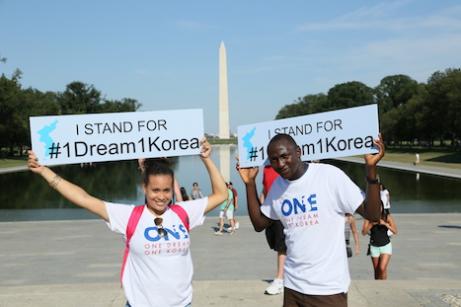“… They were smiling in the video. They looked fine. They looked healthy. But the things they talked about… When you hear someone talking about the Korean War and how their family had to separate, how their brother or sister was left in North Korea, it’s sad to think they’ve gone through so much hardship and I’ve never really heard about it, experienced or seen any of that.” –Hae Jin Son
With an increasing awareness of the campaign for the unification of the Korean peninsula, youth from around the world have added their voice to the mix. Recent events, including an agricultural project with South Korean college students and North Korean defectors, a star-studded concert in Seoul calling for unification, and a forum of experts discussing the economic platform of unification all add to the growing reality of the campaign for One Dream One Korea.

IYLA on the steps of the Lincoln Memorial during 1Dream1Korea concert.
Young leaders in the United States contributed their perspective on the reunification of North and South Korea. Although geographically and in many other ways so far apart, American students have started to become exposed more and more to Korean culture and the issues surrounding the peninsula. A graduate of the International Young Leaders Assembly (IYLA) and student at George Washington University, Hae Jin Son, was born and raised in South Korea. “In elementary school I remember that there were a lot of essay contests about reunification but after elementary school, they stopped,” Hae Jin shared, “That’s when I started forgetting about it.”
Reunification was not a common topic amongst relatives or friends, and it was not until Hae Jin came to school in America that she started to again hear more about the Korean War from friends’ parents and grandparents who fought in the war. While watching a school documentary about this event termed “the Forgotten War”, Hae Jin reflected, “I was sad and touched watching the people who experienced the Korean War giving their personal testimony. They were smiling in the video. They looked fine. They looked healthy. But the things they talked about… When you hear someone talking about the Korean War and how their family had to separate, how their brother or sister was left in North Korea, it’s sad to think they’ve gone through so much hardship and I’ve never really heard about it, experienced or seen any of that.”
“Their experience is being noticed by people all around the world who can help them get through it.”
As a person who came into the world on the same ancient soil of a once united Korea, Hae Jin realized she, like many born in the last 70 years on either side of the 38thparallel, could not help but struggle with her identity. “Is home where I come from or where I am right now?” Hae Jin asked. She went on to explain that this is just a question that reflected her ‘identity-crisis’, the same crisis she believes faces North and South Korea. After investing time in her education in America, Hae Jin remembered how, upon contacting her family and friends in Korea, they pointed out the subtle changes that had gone unnoticed with her immersion in the present, leaving behind parts of her past identity. “It’s a metaphor, “ Hae Jin smiled, “It’s like what Korea is going through: an identity-crisis. Their experience is being noticed by people all around the world who can help them get though it.”
Hae Jin and her fellow Global Ambassadors of IYLA showed their support for One Dream One Korea last August at Lincoln Memorial for a concert hosting traditional and modern Korean dancers and singers. Though the event attracted viewers from every walk of life, the majority of spectators represented those of Korean descent; grandparents and their children and grandchildren, exemplifying the importance of an ancestry and strong familial culture rooted in 5,000 years of one Korea. Korean families in America may have grown desensitized to the idea of reunification over the years by geographical distance, however, just as an exchange student calls her family back home, all it takes is a few words to question and remember, “This is who I am. This is where I come from.”
Although the discussion about Korean reunification remains distant from typical American students’ realm of reality, students like Hae Jin who’s identity is growing to encompass global citizenship strive to raise awareness of these issues, one step at a time.

Hae Jin Son (third from left) poses with fellow IYLA delegates at 1Dream1Korea concert in Washington D.C.
Learn more about One Dream One Korea. Contact us to share why you support One Dream for One Korea!
Original article: www.globalpeace.org

